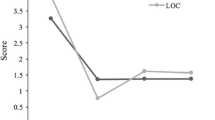Background
The impact of presurgical eating patterns on postoperative outcomes is poorly understood. The results of previous studies are mixed regarding the impact of presurgical binge eating on weight loss after surgery. However, many patients describe other maladaptive eating patterns prior to surgery, such as eating in response to emotions.The goals of this study were to describe presurgical emotional eating patterns in morbidly obese individuals, determine whether these individuals were binge eaters, and assess the effect of this eating behavior on weight loss after surgery.
Methods
Prior to surgery, 144 Roux-en-Y gastric bypass (RYGBP) patients completed the Questionnaire of Eating and Weight Patterns (QEWP) or QEWPRevised (QEWP-R) and the Emotional Eating Scale to assess eating patterns prior to surgery. Their eating behavior, levels of depression, and weight were assessed after surgery.
Results
High emotional eaters tended to have higher levels of depression, binge eating, and eating in response to external cues than low emotional eaters prior to surgery.However, there appeared to be a distinct group of individuals who were high emotional eaters but who did not engage in binge eating. At a mean of 8 months after surgery, High Emotional Eaters and Low Emotional Eaters were indistinguishable on these subscales and there were no differences in weight lost.
Conclusions
RYGBP has an equally positive impact on eating behavior and weight loss for both High Emotional Eaters and Low Emotional Eaters. Further replication is needed with longer follow-up times and larger samples.
Similar content being viewed by others
References
Kalarchian MA, Marcus MD, Wilson T et al. Binge eating among gastric bypass patients at long-term follow-up. Obes Surg 2002; 12: 270–5.
Wadden, TA, Sarwer DB, Womble LG et al. Psychosocial aspects of obesity and obesity surgery. Surg Clin North Am 2001; 81: 1001–24.
de Zwaan M, Mitchell JE, Howell M et al. Characteristics of morbidly obese patients before and after gastric bypass surgery. Comp Psychiat 2003; 5: 428–34.
American Psychiatric Association. Diagnostic and Statistical Manual of Mental Disorders. 4th edn (DSM–IV). Washington: APA 1994.
Sarwer, DB, Wadden TA, Fabricatore AN. Psychosocial and behavioral aspects of bariatric surgery. Obes Res 2005; 13: 639–48.
Brolin RE, Robertson LB, Kenler HA et al. Weight loss and dietary intake after vertical banded gastroplasty and Rouxen-Y gastric bypass. Ann Surg 1994; 220: 782–90.
Mitchell JE, Lancaster KL, Burgard MA et al. Long-term follow-up of patients’ status after gastric bypass. Obes Surg 2001; 11: 464–78.
Green AE, Dymek-Valentine M, Pytluk S et al. Psychological outcome of gastric bypass surgery for patients with and without binge eating. Obes Surg 2004; 14; 975–85.
Kalarchian MA, Wilson GT, Brolin RE et al. Effects of bariatric surgery on binge eating and related psychopathology. Eat Weight Dis 1999; 4: 1–5.
Bocchieri-Ricciardi L, Chen EY, Munoz D. Pre-surgery binge eating status: Effect on eating behavior and weight outcome after gastric bypass. Obes Surg 2006; 16: 1198–204.
White MA, Masheb RM, Rothschild BS et al. The prognostic significance of regular binge eating in extremely obese gastric bypass patients: 12-Month postoperative outcomes. J Clin Psychiatry 2006; 67: 1928–35.
Eldredge KL, Agras WS. Weight and shape overconcern and emotional eating in binge eating disorder. In J Eat Disord 1996; 19: 73–82.
Arnow B, Kenardy J, Agras WS. The emotional eating scale: The development of a measure to assess coping with negative affect by eating. Int J Eat Disord 1995; 18: 79–90.
Masheb RM, Grilo CM. Emotional overeating and its associations with eating disorder psychopathology among overweight patients with binge eating disorder. In J Eat Disord 2006; 39: 141–6
Sternberg B. Relapse in weight control: Definitions, processes, and prevention strategies. In: Marlatt GA, Gordon J, eds. Relapse Prevention: Maintenance Strategies in the Treatment of Addictive Behaviors. New York, NY: Guilford Press 1985: 521–45.
van Strien T, Ouwens MA. Counterregulation in female obese emotional eaters: Schachter, Goldman, & Gordon’s (1968) test of psychosomatic theory revisited. Eating Behaviors 2003; 3: 329–40.
Lindeman M, Stark K. Emotional eating and eating disorder psychopathology. Eating Disorders 2001; 9: 251–9.
Walfish S. Self assessed emotional factors contributing to increased weight gain in pre-surgical bariatric patients. Obes Surg 2004; 14: 1402–5.
Horchner R, Tuinebreijer W, Kelder H. Eating patterns in morbidly obese patients before and after a gastric restrictive operation. Obes Surg 2002; 12: 108–12.
Stunkard AJ, Messick S. The Three-Factor eating questionnaire to measure dietary restraint, disinhibition, and hunger. J Psychosom Res 1985; 29: 71–83.
Delin CR, Watts JM, Bassett DL. An exploration of the outcomes of gastric bypass surgery for morbid obesity: Patient characteristics and indices of success. Obes Surg 1995; 5: 159–70.
Yanovski, SJ. Binge eating disorder: Current knowledge and future directions, Obes Res 1993; 1: 306–24.
Chen EY, Bocchieri-Ricciardi L, Munoz D et al. Depressed mood in class III obesity predicted by weight related stigma. Obes Surg 2007; 17: 669–71.
Herpertz S, Kielmann R, Wolf AM et al. Do psychosocial variables predict weight loss or mental health after obesity surgery? A systematic review. Obes Res 2004; 12: 1554–69.
Larsen JK, van Ramshorst B, Geenan R et al. Binge eating and its relationship to outcome after adjustable laparascopic banding. Obes Surg 2004; 14: 1111–7.
Author information
Authors and Affiliations
Corresponding author
Rights and permissions
About this article
Cite this article
Fischer, S., Chen, E., Katterman, S. et al. Emotional Eating in a Morbidly Obese Bariatric Surgery-Seeking Population. OBES SURG 17, 778–784 (2007). https://doi.org/10.1007/s11695-007-9143-x
Received:
Accepted:
Published:
Issue Date:
DOI: https://doi.org/10.1007/s11695-007-9143-x



